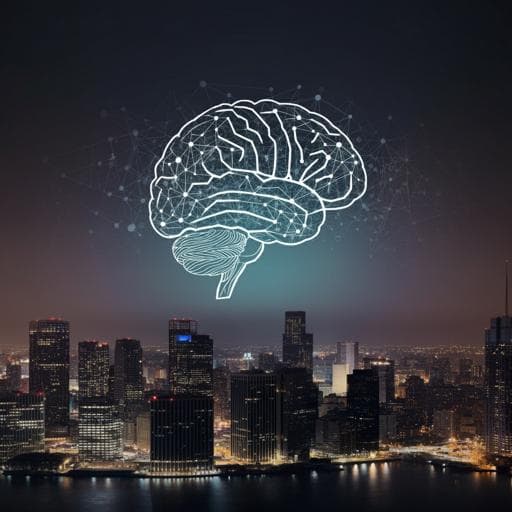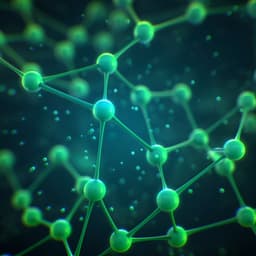
Psychology
Sleep loss leads to the withdrawal of human helping across individuals, groups, and large-scale societies
E. B. Simon, R. Vallat, et al.
The study examines whether insufficient sleep reduces human helping behavior and identifies neural mechanisms underlying this effect. Helping is pervasive and foundational to societies, scaling from interpersonal acts to large economic magnitudes of charitable giving. Prior work links prosocial decisions to a social cognition network (including mPFC, TPJ, and precuneus) and shows that lesions in these regions impair empathy and compassionate helping. Sleep loss is known to impair emotional processing and reduce activity/connectivity within social cognition regions. The authors hypothesize that lack of sleep diminishes the desire and decision to help across multiple levels: (i) within individuals, experimental sleep deprivation reduces helping and dampens social cognition network activity; (ii) within and between individuals in daily life, poorer sleep predicts next-day lower helping; and (iii) at a societal level, a one-hour reduction in sleep opportunity due to Daylight Saving Time (DST) reduces real-world altruistic donations.
The authors review determinants of helping spanning evolutionary motives (kin selection, reciprocal altruism), cultural norms, socioeconomic context, and personality traits such as empathy. Neuroimaging consistently implicates a social cognition network (mPFC, superior/middle temporal sulcus, TPJ, precuneus) in mentalizing and prosocial decision-making, while damage to these regions leads to reduced empathy and helping. Evidence shows insufficient sleep increases emotional reactivity, impairs emotion recognition, reduces trust, and diminishes activity/connectivity in social cognition regions (including mPFC, TPJ, precuneus). DST-related sleep loss has documented impacts on accidents, cardiovascular events, and mood, motivating its use as a natural experiment for societal effects on helping.
The research comprises three studies. Study 1 (in-lab, randomized crossover): 24 healthy adults (18–26 years) completed two counterbalanced sessions: one after a normal night of sleep and one after 24 h sleep deprivation. Helping behavior was assessed in the morning with a 40-item Self-Report Altruism–based helping questionnaire (balanced scenarios involving strangers and familiar others). Mood was measured with PANAS (evening and next morning). An incentivized effort task assessed volitional effort. Participants completed a social judgment fMRI paradigm (mentalizing task) at matched circadian times across sessions, rating perceived competence/warmth for 48 human targets versus object-age ratings for 32 items. fMRI acquisition (Siemens 3T) and preprocessing used fMRIPrep, SPM GLM contrasts (human > object), with a priori ROIs from a NeuroSynth-derived social cognition mask (8 ROIs; FDR < 0.01). Motion, CompCor, and reaction times were included as nuisance regressors in sensitivity analyses. Polysomnography recorded sleep in the rested condition. Study 2 (micro-longitudinal, free-living): 171 recruited via MTurk; final N=136 (37.8 ± 0.87 years, 41.9% female) provided daily sleep diaries and completed a 10-item helping questionnaire across 4 consecutive weekdays (441 observations). Sleep efficiency (percent of time asleep while in bed) and sleep duration were computed; person-mean centering separated within- and between-person effects. Daily mood (short PANAS) and baseline trait empathy (IRI) were measured. Linear mixed-effects models adjusted for age, sex, and survey version examined whether night-to-night sleep predicted next-day helping, including models controlling for mood, trait empathy, and prior-day helping. Study 3 (societal, natural experiment): Donation data from DonorsChoose (US) 2001–2016. After exclusions, 3,420,996 donations aggregated to 18,034 daily observations from DST-observing states (excluding AZ and HI). Outcome: log-transformed daily average donation amount. Main predictor: week type (weekdays of DST transition week vs weekdays before/after vs other weekdays). Models controlled for time-of-day (four 6-h bins), day of week, month, year, weekends, and holidays. Control analyses: (a) transition back to Standard Time (ST), (b) donations from non-DST states (AZ/HI) during March/April, and (c) inclusion of number of donations (log) to account for reduced available donation time on 23-h DST change day.
Study 1 (causal, within-subject): One night of total sleep deprivation significantly decreased the desire to help compared to the same individuals when rested (N=23 analyzed; helping score means ± SE: Sleep Rested 3.88 ± 0.12, Sleep Deprived 3.59 ± 0.13; main effect of sleep F(1,22)=7.67, ηp²=0.259, d=1.054, mean difference = −0.29 ± 0.1, 95% CI = [−0.07, −0.51], P=0.011). Seventy-eight percent of individuals showed reduced helping. Effects persisted when controlling for mood and effort (β = −0.55 ± 0.18, t = −2.9, P < 0.01, R² = 0.28) and were unrelated to trait empathy (R = 0.3, P > 0.15). Reductions were significant for helping strangers (t(22)= −2.47, P=0.021) and familiar others (t(22)= −2.66, P=0.014), with no interaction by familiarity (F(1,22)=0.65, P=0.43). fMRI showed significantly reduced activity within the social cognition network after sleep deprivation (mean change + SE = −0.46 ± 0.18, P=0.02, d=0.7). The magnitude of network activity reduction predicted individual decreases in helping (R=0.42, P=0.046, n=23). No other standard functional networks showed significant effects or associations (all P > 0.1, FDR-corrected). Results remained after controlling for attention (reaction times), mood, and effort. Study 2 (micro-longitudinal): Poorer sleep efficiency from night to night predicted lower next-day helping within individuals (β = 0.02 ± 0.01, P < 0.05) and across individuals (between-person β = 0.04 ± 0.01, P < 0.001), independent of sleep duration (P > 0.28). Effects remained when controlling for trait empathy and daily mood (within β = 0.02 ± 0.01, P < 0.05; between β = 0.03 ± 0.006, P < 0.001) and after accounting for prior-day helping (within β = 0.04 ± 0.01, P < 0.01; between β = 0.02 ± 0.004, P < 0.001). No robust links were found between sleep duration and helping. Study 3 (societal, natural experiment): During the week following the spring transition to DST (loss of 1 h sleep opportunity), daily average donation amounts significantly decreased relative to surrounding weeks (coefficient for DST week ≈ −0.09 ± 0.04, P < 0.05), controlling for time-of-day, weekday, month, year, weekends, and holidays. Control models found no significant changes during the return to Standard Time (β = −0.03 ± 0.04, P > 0.4) and no effects in non-DST states during the same March/April period (β = 0.02 ± 0.08, P > 0.7). Results held when additionally controlling for the number of daily donations (DST week ≈ −0.09 ± 0.04, P < 0.05), indicating the effect was not due to reduced available time to donate on the 23-h DST day.
Across laboratory, daily life, and societal scales, insufficient sleep diminishes human helping. Study 1 demonstrates a causal reduction in helping desire after one night of sleep deprivation, linked to selective decreases in activity across the social cognition network (mPFC, TPJ, precuneus, etc.), and independent of mood, effort, attention, or trait empathy. The mentalizing task assessed a core prosocial process—understanding others’ attributes and states—providing a mechanistic bridge between sleep-dependent neural function and helping motivation. Study 2 shows that even modest, ecological night-to-night reductions in sleep efficiency predict next-day declines in helping both within and between individuals, suggesting sleep quality (once a nominal duration threshold is met) is a key predictor of prosocial motivation. Study 3 extends these findings to real-world consequential behavior: the societal loss of just one hour of sleep opportunity during DST robustly reduces philanthropic giving, and this effect is not observed during the return to ST, in non-DST states, or when accounting for reduced available time to donate. The effect does not depend on direct interpersonal interaction, indicating an intrinsic shift in socioemotional functioning under sleep loss. Potential mechanisms include heightened stress physiology (sympathetic dominance, HPA axis activation, elevated cortisol) and mood alterations that can dampen empathic engagement, though primary effects were specific to the social cognition network. Collectively, the findings highlight sleep as a modifiable determinant of prosocial behavior, with implications for social capital, civic engagement, and the ‘helping economy’ amid widespread insufficient sleep in modern societies.
The paper identifies inadequate sleep as a previously underrecognized determinant of prosocial helping, operating at neural, individual, and societal levels. Causally, one night of sleep loss reduces helping desire and selectively suppresses social cognition network activity. In daily life, poorer sleep efficiency predicts next-day declines in helping. At scale, the DST-induced loss of one hour of sleep opportunity lowers real-world charitable donations. These results suggest that improving sleep quantity and quality may preserve and enhance helping behaviors critical to cooperative society. Future research should: (1) probe neural effects of sleep loss using overt, incentivized altruistic decision-making tasks; (2) test causal interventions that improve sleep to increase prosocial actions; (3) examine mediating roles of stress physiology and mood; and (4) generalize beyond MTurk and a single donation platform, assessing broader forms of prosociality and diverse populations.
- Study 1’s fMRI task measured mentalizing during trait judgments rather than incentivized, overt altruistic decisions; next-step tasks involving direct charitable choices could refine neural interpretations.
- Study 2 relied on self-reported sleep diaries over a short 4-day window, which may introduce reporting bias and limits assessment of longer-term effects; duration effects may have been underpowered relative to efficiency.
- Study 3’s societal analysis uses a single donation platform (DonorsChoose) as a proxy for altruistic helping; although extensive controls were applied (seasonality, non-DST states, ST transition, number of donations), unmeasured confounds specific to platform usage or contemporaneous events cannot be entirely excluded.
- The return-to-Standard-Time (ST) analyses showed nonsignificant effects, which may reflect differential adaptation to phase delays versus advances or incomplete uptake of extra sleep opportunity, complicating bidirectionality inferences.
- Generalizability may be constrained by the demographics of the laboratory sample (young healthy adults) and the MTurk cohort in Study 2.
Related Publications
Explore these studies to deepen your understanding of the subject.







